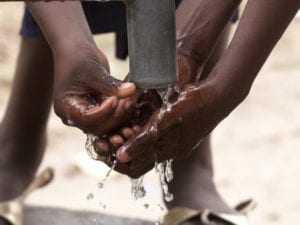The Department of Water and Sanitation’s (DWS) relief efforts to mount water tanks continue to gain momentum as 1 785 water tanks have been delivered in water-deprived communities across Gauteng to slow the further spread of the novel coronavirus.
The Department is mainly targeting drought-stricken areas, rural communities as well as indigent and densely populated communities to ensure that they access water easily and swiftly in the form of water tanks and water tankers. This is after Minister Lindiwe Sisulu called on the Department to marshal its resources to ensure that vulnerable communities were not negatively impacted and did not suffer the hardest with the spread of the virus. Significant strides have been made in different areas of the province, including the Cities of Joburg, Tshwane and Ekurhuleni and the West Rand and Sedibeng District Municipalities. Head of DWS in Gauteng, Sibusiso Mthembu, said it was in everyone’s interest that the needy communities were provided access to clean water as this meant that they would be able to wash their hands regularly to prevent a crisis of the infection rate going up.Mthembu said communities around Gauteng were grateful that the Department was addressing the issue of water shortages in the manner in which it was doing, adding that the Department was determined to do all it could for people to access clean water.
He said the picture of lack of water was changing in communities as the supply of water was gradually meeting the demand of communities and expressed hope that there was no gaping need for water in the future. “As Minister Sisulu has instructed us, we must ensure that families are not devastated by this virus simply because they do not have access to water to practice proper hygiene. The country is presently in uncharted waters as we have not experienced something like this before. So, this is not a time to let up but to double our efforts to ensure that we defeat this virus,” said Mthembu. The Department urged communities to work cooperatively with municipalities to safeguard the water tanks because they provided a lifeline that protects those that are most at risk. Mthembu cautioned communities against acts of destruction of infrastructure. He said: “The water tanks the Department is rolling out is the property of the communities and so it is up to them to ensure that they look after them. It is therefore in the interest of communities to look after their infrastructure. The destruction of this infrastructure means thatit is them who will bear the brunt after all.”






